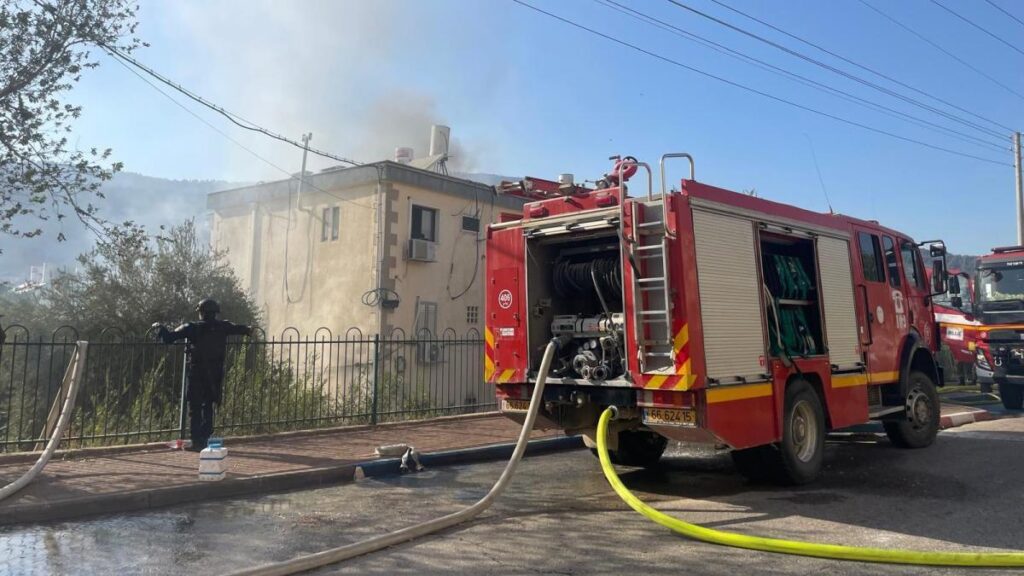The ongoing conflict between Hezbollah and Israel has escalated dramatically, resulting in tragic civilian casualties and increasing hostilities along the Lebanese-Israeli border. In a recent development, two civilians, a couple in their 40s, were killed and several others injured after Hezbollah launched a barrage of at least 150 rockets into northern Israel. The attack specifically targeted Kiryat Shmona, where the couple was tragically caught in the crossfire while walking their dog. This incident marks a grim milestone, as these are the first Israeli civilian deaths attributed to Hezbollah since the resurgence of conflict that began two weeks prior, when Israel intensified its air campaign against the Iran-backed group in retaliatory measures that included an invasion of southern Lebanon.
The situation in Kiryat Shmona, a town close to the border, has become increasingly precarious. Residents have largely evacuated amidst the persistent threat of rocket attacks that have defined life there for the past year. When Hezbollah struck on Wednesday, it not only led to fatalities but also ignited several fires across the town, with emergency services working tirelessly to combat the blazes. Witnesses like Katy Krelshtein expressed a mix of disbelief and anger, reflecting a community that has long endured the stress and trauma of constant bombardment. Many locals voiced a yearning for their military to take decisive action to halt the rocket fire that has plagued their lives, indicating a growing frustration and desperation for safety amidst the chaos.
Reports from the area highlight the daily realities of residents living under the shadow of conflict, with rocket alerts becoming a routine part of life. With just seconds to reach safety, the sense of urgency and fear has morphed into a state of heightened wartime anxiety. In one instance, a barrage of rockets was intercepted by Israeli defenses just moments after their launch, underscoring the immediacy of the threat posed by Hezbollah’s attacks. Another resident, Shelley Barkan, lamented the dire situation, stating her belief that the intention behind the assaults is to eliminate them, while revealing her commitment to the local community by providing food for soldiers fighting on the frontlines.
As tensions mount, Israel has taken a more aggressive stance against Hezbollah, asserting that their military actions are necessary to protect displaced residents who have fled from the border area due to the relentless rocket and missile strikes. The conflict’s escalation traces back to October 8, 2023, when Hezbollah commenced its bombardment in solidarity with Palestinians during the ongoing war in Gaza. The Israeli military has framed its ground invasion as a mission to neutralize Hezbollah’s capacity to threaten Israeli lives along the border, signifying a critical pivot in national defense strategy amid ongoing hostilities that threaten regional stability.
On the day of the recent attacks, battles erupted between Israeli forces and Hezbollah fighters across various locations in southern Lebanon. Hezbollah reported that its operatives successfully pushed back Israeli troops and conducted shelling operations against advancing units. Meanwhile, the Israeli military claimed to have targeted and dismantled over 100 Hezbollah installations within a 24-hour period, indicating a fierce and escalating combat environment. The conflict has not only impacted military targets but has also resulted in collateral civilian damage, with reports of at least four casualties among displaced families due to Israeli airstrikes in the village of Wardaniyeh, exacerbating the humanitarian crisis already unfolding in the region.
The unfolding situation has laid bare the complexities and tragedies of conflict in the region, with each side taking retaliatory measures that exacerbate the cycle of violence. As Israelis seek the return of safety to their border areas, the toll on civilians, both in Israel and Lebanon, continues to rise amidst an environment of fear, anger, and desperation. The collective suffering witnessed in Kiryat Shmona and beyond underscores the urgent need for diplomatic solutions that prioritize civilian lives and de-escalate hostilities, although the pathway to peace appears increasingly fraught amidst entrenched animosities and retaliatory cycles. As the situation develops, the international community watches cautiously, aware that the ramifications of the conflict could extend far beyond the immediate region, affecting global security dynamics and humanitarian efforts in the weeks and months to come.

